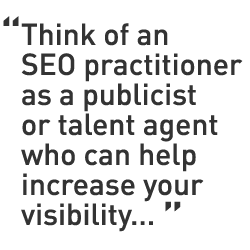What Is a Good Local SEO ROI for Multi-Location Businesses?
We know that organic traffic is valuable. It’s the holy grail for many marketers who monitor their organic traffic results obsessively, hoping for...

We live in a world that is accustomed to – and spoiled by – instant gratification. We don’t wait 3 weeks to receive things from a catalogs anymore, we can communicate with almost anyone instantly from almost anywhere we are, and when wepay for an ad we expect to see it show up at a predetermined time. I get it. Unfortunately, that is not how SEO works, and this expectation of immediacy invariably leads to the question…”Why isn’t my website number one on Google yet?”
The reality is that organic SEO has never been a placement activity. You must be considered worthy of visibility, and relevant, for the search query that was submitted to rank well on the SERPs (search engine result pages). No SEO company can force the search engines to show your listing organically, “organic” being a key point here. SEO practitioners can only set up conditions that are favorable for accomplishing that goal. If you want to show up at a predetermined time within local search – or social – it will be via paid ad units, just as you would go after in a newspaper, magazine, or other such publication.
 To take the analogy a bit further, such publications run stories about subjects of interest to their readers in addition to advertising. This is what keeps their readerships happy: no one wants to see only advertisements, after all. To develop these stories, publications seek out writers who have proven expertise in a subject or simply a great tale to tell. Of course, space in most publications is limited and their readers’ time valuable, so stories must be sharply focused, too. All of this pertains as well to how search engines operate. Think of an SEO practitioner as a publicist or talent agent who can help increase your visibility and thus give you a greater chance of being considered worthy of high local SERP placement. The sad truth is, though, that just like publications, the search engines don’t always pick the most relevant or qualified content.
To take the analogy a bit further, such publications run stories about subjects of interest to their readers in addition to advertising. This is what keeps their readerships happy: no one wants to see only advertisements, after all. To develop these stories, publications seek out writers who have proven expertise in a subject or simply a great tale to tell. Of course, space in most publications is limited and their readers’ time valuable, so stories must be sharply focused, too. All of this pertains as well to how search engines operate. Think of an SEO practitioner as a publicist or talent agent who can help increase your visibility and thus give you a greater chance of being considered worthy of high local SERP placement. The sad truth is, though, that just like publications, the search engines don’t always pick the most relevant or qualified content.
I understand and can tell you that you are not alone in being frustrated by how long it often takes for content you created to become visible. But – and I’ve always tried to be crystal clear about this – Google just isn’t going to all of a sudden put you ahead of other companies that have been proving relevance actively for years. The domains or pages that show up currently have a track record with Google and have earned authority. But enough backstory. What does this mean to you?
If you’re not paying for placement, what are you paying a web company or optimizer for? You pay these professionals to:
Provide a site that represents your brand professionally and is consistent with your other marketing material.
Construct a site that search engines will find, understand, and index properly.
Establish strategies to bring in leads that reflect the research the local SEO company has done on your competition, industry, personas (audience), and content requirements.
Utilize best web development practices, and deploy a CMS that not only allows you to efficiently add content but also has the right system architecture to support required content strategy and conversion.
Build your site in such a way as to support social media engagement, sharing, and tie-in from offline marketing efforts.
Help formulate a strategy for converting traffic that does arrive to the site or page.
Provide suggestions for obtaining natural, deserved, and organic-looking backlinks and reviews.
If you can indulge me while I switch from my previous analogy: this is the vehicle. You have to give it gas. And one tank isn’t going to get you very far. In other words, you can’t simply check this off your to-do list.
The time and effort you put into content development is the gas. The more throttle you can give your vehicle, the quicker it will get you where you want to go. But you still aren’t automatically going to beat someone with a bigger engine. If your primary competitor has a person dedicated to content creation for its site and social activity and you do not have such a person to address your needs, you are going to have to work harder and smarter. If the industry you are in is very competitive, it is likely because there are sales to be had.
 Look at it this way, too: the time and effort you put into content development, including local SEO, is a long-term investment. You don’t plop down money at the bank and say, give me 10 years of interest right now. This is why strategy is so important. And while scant resources make it difficult to invest in content development consistently, good, relevant content is an imperative search signal.
Look at it this way, too: the time and effort you put into content development, including local SEO, is a long-term investment. You don’t plop down money at the bank and say, give me 10 years of interest right now. This is why strategy is so important. And while scant resources make it difficult to invest in content development consistently, good, relevant content is an imperative search signal.
Unfortunately, this is a cumulative process and it takes time. The road to visibility is paved with diligent effort. You must constantly refuel your site with new and relevant content. The slower you are in doing this, the slower you will be in gaining visibility. The process won’t necessarily stop, but it will slow down. And really, if you think about it, that is what makes it reasonably fair. Businesses who put in the resources and time should be rewarded more than those who do not. Have you budgeted to put the appropriate resources and time into your site and local SEO for 2014?

We know that organic traffic is valuable. It’s the holy grail for many marketers who monitor their organic traffic results obsessively, hoping for...

Before national brand marketers had social media channels to help them get messages to consumers in a wide range of local markets, they would turn to...

For multi-location brands, local content is their Achilles heel—a vulnerability that, in the business world, can lead to lost business, sales, and...